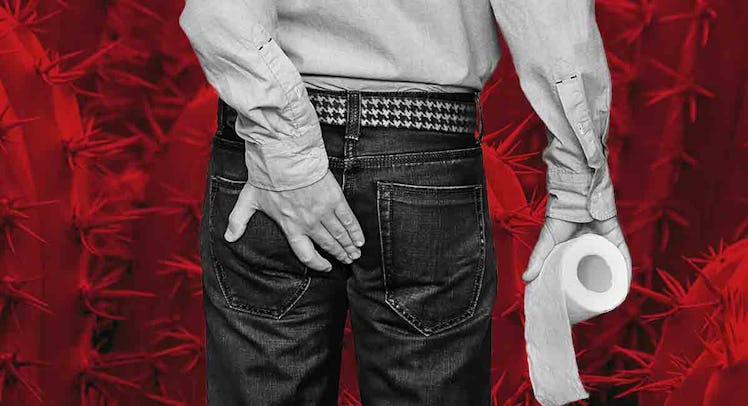Why You Have Hemorrhoids And How to Get Rid Of Them
It's more than a pain in the ass, doctors warn.

The word hemorrhoids is about as hard to spell as “diarrhea,” and the condition is almost as common. Approximately 10 million Americans have hemorrhoids, and about half of adults get them by the age of 50.
If you don’t have hemorrhoids, odds are your wife does.
Hemorrhoids arise from from blood-vessel-filled cushions in the upper part of the anal canal, which can become aggravated over time. “As we age, the connective tissue that anchors these venous cushions to your rectum deteriorates,” says Dr. Christopher Hollingsworth of NYC Surgical Associates. “As this connective tissue deteriorates, the symptoms of hemorrhoids worsen the more they hang down into the anal canal.”
But age is only one cause. Among women, hemorrhoids often develop during pregnancy when elevated progestin levels dilate the veins into cushions, causing them to swell. Among men, prolonged sitting, straining, diarrhea, chronic constipation, chronic vein problems, and even food allergies, can contribute.
There is a wide range when it comes to hemorrhoid severity. “People don’t always realize that they have them,” Hollingsworth says, adding that common symptoms included blood on toilet paper, pain when pooping, taking extra time passing bowel movements, or feeling like you have to go and nothing comes out. “Hemorrhoids can also itch, and you can sometimes have stool leaking out even when you aren’t using the bathroom because of them. Swelling around the rectum or feeling like something is sticking out is common.” Grade one hemorrhoids are internal, only occasionally bleed, and can resolve on their own. Grade four hemorrhoids are permanently, externally prolapsed and require surgery to treat.
More minor cases of hemorrhoids can resolve on their own with some lifestyle changes, such as consuming more fiber and water, reducing the amount of “reading” time on the toilet or, at the very least, the amount of strain exerted while working on that crossword puzzle. More advanced cases may require ointments, laser removal, or band ligation, a procedure that involves wrapping tight bands around individual hemorrhoids. The greatest risk associated with hemorrhoids is ignoring them entirely, without seeking medical advice, according to Dr. Donald Tsynman of Manhattan Gastroenterology. Blood in your stool could be hemorrhoids, but it could also be something more serious, like anal cancer. So even if you suspect hemorrhoids, talk to your doctor just to rule out rare, but life-threatening concerns.
“Not all problems of the tush are ‘just hemorrhoids’ and oftentimes symptoms at the rectum can be representative of significant disease that needs to be evaluated,” Tsynman told Fatherly.
“Blood with bowel movements or when you wipe should not be assumed to be innocuous.”